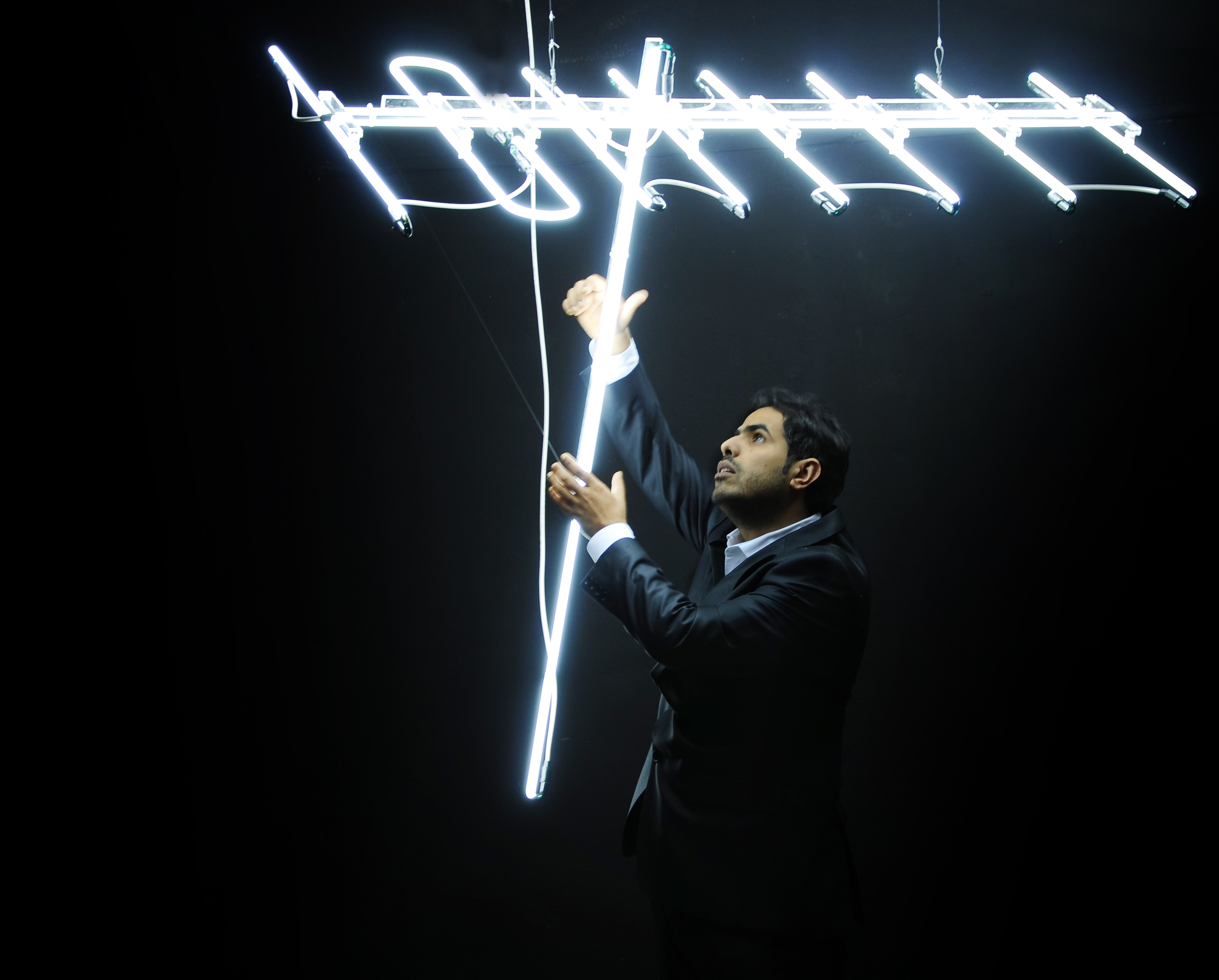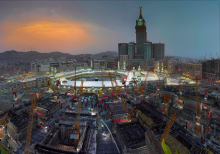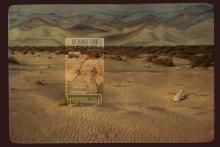*IMPORTANT UPDATE: This event was rescheduled for Thursday, March 24 from 4:00pm-5:00pm. Due to a security shutdown in the vicinity of the White House, the Corcoran was closed on Tuesday, March 22 and this event was cancelled*
The Middle East Institute (MEI) and the Corcoran School of the Arts and Design at George Washington University are pleased to co-host leading Saudi artist Ahmed Mater for a discussion about his groundbreaking work in video, photography, painting, and installation offering an unparalleled perspective on contemporary Saudi Arabia.
He will be joined in conversation by Carol Huh, curator of contemporary Asian art at the Freer|Sackler Gallery, which is hosting Mater's first solo U.S. exhibition, Symbolic Cities, opening on March 19.
Mater's work explores the narratives and aesthetics of Islamic culture in an era of globalization, consumerism, and transformation. His recent work increasingly uses image and video to explore local collective memory and unofficial histories behind contemporary Saudi Arabian sociopolitical life with a focus on the cities of Mecca and Riyadh.
The conversation will be moderated by Sanjit Sethi, director of the Corcoran School of the Arts and Design.
This event is supported by Art Jameel. Art Jameel, one of Community Jameel's Initiatives, fosters and promotes contemporary art and creative entrepreneurship across the MENAT region.
Ahmed Mater's Other Public Events
This is just one in a series of Mater's public appearances during his visit to D.C. this month. Click below to learn more about other opportunities to see him speak.
Speaker Biographies:
Carol Huh
Curator of Contemporary Asian Art, Freer|Sackler Gallery, Smithsonian Museum of Asian Art
Carol Huh is the first curator of contemporary art at the Freer and Sackler. Through exhibitions, acquisitions, and public programs, she is responsible for further developing the Galleries’ effort to explore current environments of artistic production and social change related to Asia. Recent projects have included the museum’s ongoing Perspectives series (including works by Y.Z. Kami, Anish Kapoor, Hai Bo, Hale Tenger, Lu Chunsheng, Minouk Lim, Ai Weiwei, and Rina Banerjee). Huh organized Moving Perspectives, the Galleries’ first series of exhibitions focusing on video art from Asia (with works by Shahzia Sikander, Lida Abdul, Dinh Q Lé, Yang Fudong, and Yeondoo Jung, among others). Special exhibitions include works by Ahmed Mater (upcoming 2016), Sense of Place: Landscape Photographs from Asia (2013), Nine Deaths, Two Births: Xu Bing’s Phoenix Project (2013), Shadow Sites: Recent Work by Jananne al-Ani (2012), and Fiona Tan: Rise and Fall (in-house curator, 2010). She is responsible for building the Galleries’ collections of contemporary Asian art, especially in the area of photography. Huh is co-chair of the Smithsonian Artist Research Fellowship Committee and member of the Smithsonian Networks Review Committee.
Ahmed Mater
Saudi Arabian Contemporary Artist
Ahmed Mater, born and raised in southern Saudi Arabia and trained as a medical doctor, has been a practicing artist since the early 1990s. Mater's work grapples with the narratives and aesthetics of Islamic culture in an era of globalization, consumerism, and transformation. Using photography and video, Mater explores collective memory and unofficial histories behind contemporary Saudi Arabian sociopolitical life. In 2003, Mater founded Al- Meftaha Arts Village in Abha and co-founded Edge of Arabia, a non-profit social enterprise dedicated to dialogue and exchange between the Middle East and the West through exhibitions, publications, and public programming. His Freer|Sackler exhibit, Symbolic Cities, presents the extraordinary transformation of Mecca and the artists’ visual and aural journeys observing economic and urban change in Saudi Arabia. Mater’s work has been widely exhibited around the world, including at The Mori Museum of Art in Japan, the Sharjah Biennale in UAE, Home Works 6 at Ashkal Alwan in Lebanon, and Galleria Continua’s Le Moulin in France, among others. Additionally, his work is in the collection of the British Museum in London, the Los Angeles County Museum of Art, the Museum of Islamic Art in Doha, and the Centre Pompidou in Paris. Most recently, Mater debuted his 100 Found Objects at the Sharjah Art Foundation.
Sanjit Sethi
Director, Corcoran School of the Arts and Design at the George Washington University
Sanjit Sethi is the director of the Corcoran School of the Arts and Design at the George Washington University. He is an artist and administrator, skilled in facilitating partnerships and managing an arts organization. Sethi received a BFA in 1994 from the New York State College of Ceramics at Alfred University, an MFA in 1998 from the University of Georgia, and an MS in advanced visual studies in 2002 from the Massachusetts Institute of Technology. He has taught at numerous academic institutions including the Memphis College of Art, the Srishti School of Art, Design and Technology, and California College of the Arts. His work deals with issues of nomadism, identity, the residue of labor, and memory. Sethi was previously executive director of the Santa Fe Art Institute (SFAI) and prior to that was director of the Center for Art and Public Life and Barclay Simpson Professor/ Chair of Community Arts at the California College of the Arts.
Sponsored By:
















